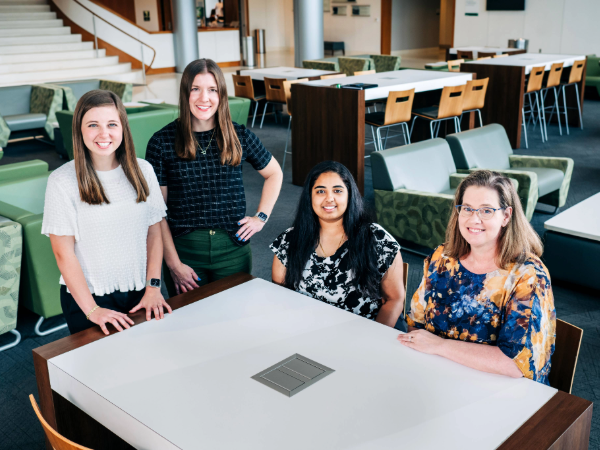While University of Alabama at Birmingham (UAB) inventors are well-known for coming up with innovative ideas, sometimes those ideas need some clarification and refining before they’re ready to roll out.
That’s where the Bill L. Harbert Institute for Innovation and Entrepreneurship (HIIE) comes in with the Blazer App Accelerator (BAA) program, which provides early-stage entrepreneurs with training, mentorship, and hands-on support through a partnership with Harmony Venture Labs’ AppThink program. Over a total of eight weeks, participants validate their concepts while building a prototype, then learn how to build an audience, take their inventions to market and scale the product and company.
Early returns suggest the BAA is working – three out of this year’s nine Blazer Bridge Fund (BBF) winners were also members of the first cohort of the BAA program.
The BBF is another HIIE program, in which UAB faculty and staff entrepreneurs can apply for up to $50,000 in funds to develop their technologies. Cori Perdue, Ph.D. (right) with, left to right, Haley Nolen, Hannah Broom and Shivani Palaparthi at the Collat School of Business. Their project, tentatively titled the DISCovery Communication Coaching App, helps users better recognize different communication styles and tailor their messaging accordingly.
Cori Perdue, Ph.D. (right) with, left to right, Haley Nolen, Hannah Broom and Shivani Palaparthi at the Collat School of Business. Their project, tentatively titled the DISCovery Communication Coaching App, helps users better recognize different communication styles and tailor their messaging accordingly.
The 2025 BBF recipients who also participated in the Blazer App Accelerator are:
- Ryan Melvin, Ph.D., and Ryan Godwin, Ph.D., from the Department of Anesthesiology and Perioperative Medicine. They invented the IRB Assistant, which uses AI to identify and summarize the latest research in medical subspecialties. The tool also offers podcast-style audio summaries, allowing physicians, especially new residents, to stay current on the go.
- Cori Perdue, Ph.D. and Sai Shivani Palaparthi of the Collat School of Business. The duo created the DISCovery Communication Coaching App, a web-based platform that helps users engage more effectively with diverse communication styles. Originally imagined as a virtual reality tool, the project evolved into a more accessible app designed to build users’ confidence and communication skills.
- Kristine Lokken, Ph.D., from the Department of Psychiatry and Behavioral Neurobiology. She invented a hybrid program designed to help prevent cognitive decline. Combining in-person workshops with an app that tracks health data and delivers personalized microlearning modules, it provides tailored guidance on nutrition, stress, sleep, exercise, and toxin exposure.
“The BAA made us think of other ways to solve the problem and helped us focus on who our target customer base is, rather than trying to be all things to all people,” said Melvin, co-inventor of the IRB Assistant. “By the end, we had greater clarity on who our customer was and how to reach them.”
Palaparthi and Perdue, the creators of the DISCovery Communication Coaching App, said they also experienced a similar shift in thinking.
“The mentorship and guidance we received were instrumental in helping us keep moving in the right direction,” Perdue said.
Palaparthi added that the experience gave their team confidence to reshape their idea. “The encouragement to test early was invaluable — it ensured we were shaping the application around real feedback, not assumptions,” Palaparthi said.
Lokken, who developed the Precision Brain Health companion app, said the programs gave her a clear, step-by-step guide for translating research into a working product.
“The HIIE really bridged the gap between academic research and entrepreneurship. These programs offered a clear roadmap for turning an idea into a working prototype,” she said.
The second cohort for the Blazer App Accelerator will be chosen by the HIIE in late 2025.
Visit the webpage and the Blazer Bridge Fund webpage to learn more.
-- Oct. 9, 2025